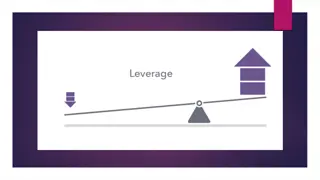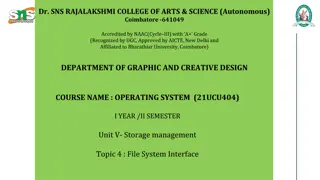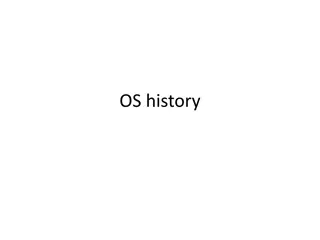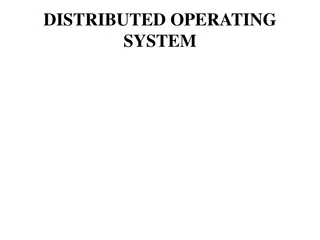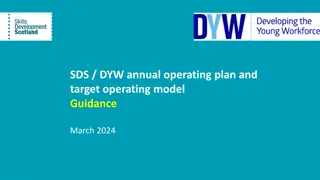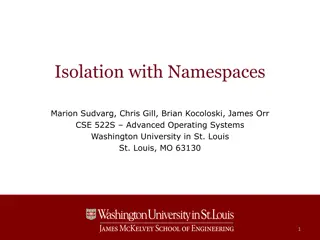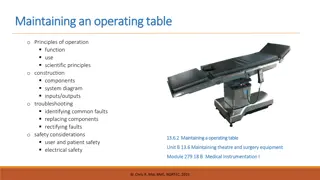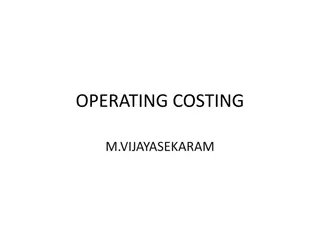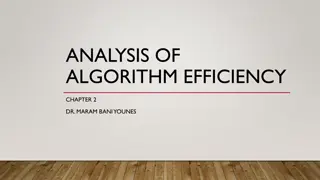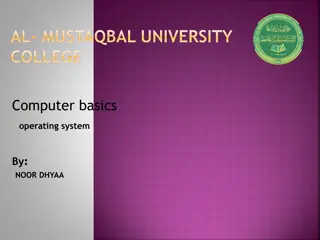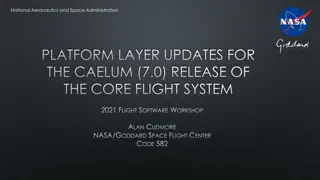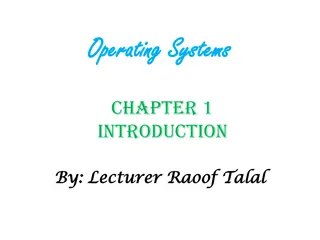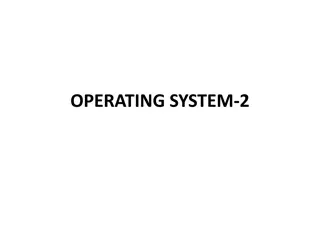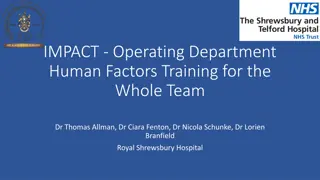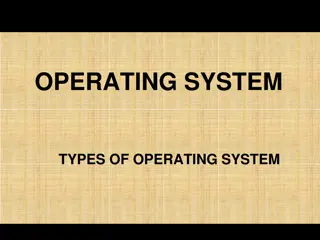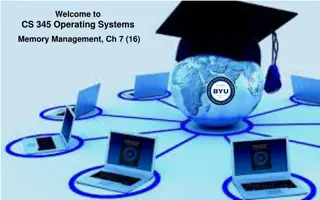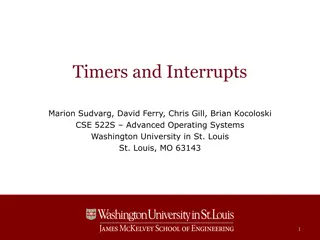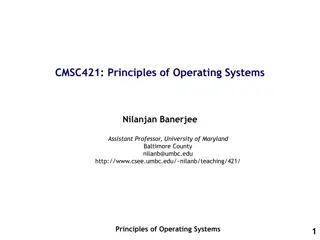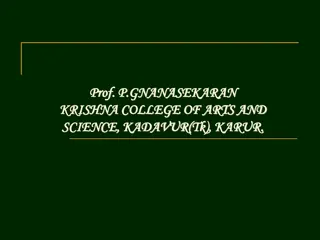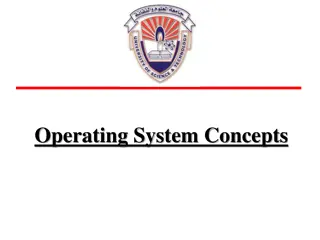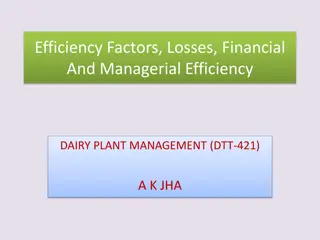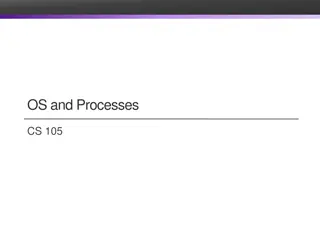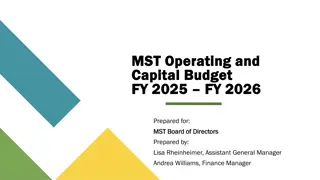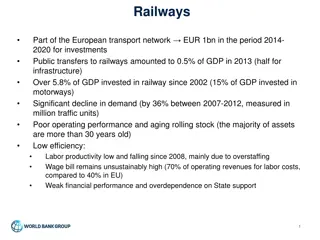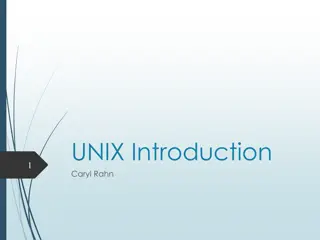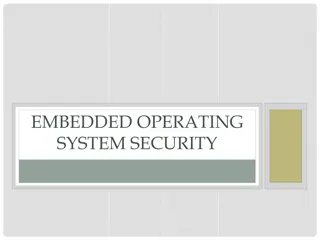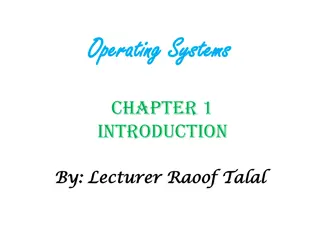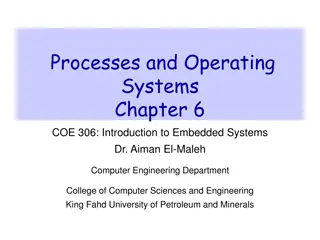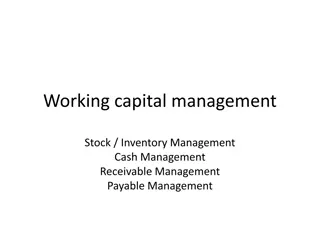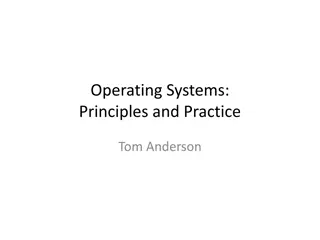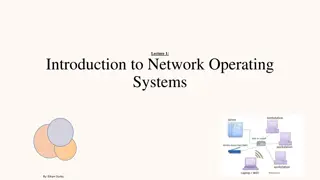Understanding Leverage and Operating Leverage in Financial Management
Leverage in financial management refers to using assets or funds with fixed costs to analyze the impact of debt and equity mix on shareholder returns and risk. Operating leverage focuses on leveraging fixed operating costs to amplify profit changes with sales variations, measured by the degree of op
2 views • 6 slides
Operating Systems
An operating system is a crucial program that manages all other programs on a computer. It handles tasks like input recognition, file management, and device control. There are different types of operating systems such as single-user, single-task systems, multi-user, multi-task systems, real-time ope
6 views • 11 slides
Understanding File System Interface in Operating Systems
The file system interface is a crucial aspect of any operating system, providing users with a method for storage and access to data and programs. It comprises files for data storage and a directory structure for organizing and managing files within the system. File attributes like name, identifier,
0 views • 8 slides
Evolution of Operating Systems: From Mainframe Computers to Unix
Before the 1950s, users interacted directly with mainframe computers without an operating system, debugging using control panels. The transition to writing programs in symbolic languages led to the need for specific drivers. Run queues and operator-assisted job submissions marked this era. The first
0 views • 41 slides
Overview of Distributed Operating Systems
Distributed Operating Systems (DOS) manage computer resources and provide users with convenient interfaces. Unlike centralized systems, DOS runs on multiple independent CPUs and prioritizes software over hardware. It ensures transparency and fault tolerance, with a focus on software error handling.
1 views • 36 slides
SDS/DYW Annual Operating Plan and Target Operating Model Guidance - March 2024
This guidance outlines the development of an Annual Operating Plan and Target Operating Model (TOM) to enhance collaboration and improve outcomes for young people. It emphasizes aligning planning activities, co-designing learner experiences, and maximizing collective resources through strategic part
1 views • 9 slides
Understanding Isolation and Virtualization in Operating Systems
This text delves into the concepts of isolation and virtualization in operating systems. It covers topics such as virtual memory, virtual machines, containers, and kernel isolation mechanisms like chroot and cgroups. The discussion explores how these techniques provide isolation between processes, c
5 views • 20 slides
Maintaining an Operating Table: Principles and Functions
An operating table system comprises three components - the table column, table top, and transporter, each available in different versions for various surgical disciplines. Stationary tables are anchored to the floor, offering flexibility to adapt to patient needs. Mobile tables provide maneuverabili
0 views • 12 slides
Understanding Operating Costing in Service Industries
Operating costing is a method utilized by service-oriented businesses to ascertain the costs of providing services. Industries such as transportation services, welfare services, utility suppliers, and municipal services find operating costing beneficial. The method involves classifying costs into th
0 views • 6 slides
Understanding Algorithm Efficiency Analysis
In this chapter, Dr. Maram Bani Younes delves into the analysis of algorithm efficiency, focusing on aspects such as order of growth, best case scenarios, and empirical analysis of time efficiency. The dimensions of generality, simplicity, time efficiency, and space efficiency are explored, with a d
1 views • 28 slides
Understanding Operating Systems: Basics and Types
An operating system is essential software that manages a computer's hardware and software, allowing users to interact with the computer. Learn about the functions of an operating system, its importance, types available such as Microsoft Windows and macOS, and how they impact different devices. Disco
1 views • 11 slides
NASA Platform Layer Updates for the CAELUM (7.0) Release
The National Aeronautics and Space Administration (NASA) discusses platform layer updates for the CAELUM (7.0) release of the Core Flight System in the 2021 Flight Software Workshop. The platform layer consists of the Operating System Abstraction Layer (OSAL) and Platform Support Package (PSP), whic
1 views • 20 slides
Understanding Operating Systems: Introduction and Functions
An operating system plays a crucial role in managing computer hardware and facilitating user-computer interactions. It serves as an intermediary between users and hardware components, ensuring efficient resource allocation and control. The operating system coordinates the use of hardware resources b
5 views • 16 slides
Evolution of Operating Systems: A Historical Journey
Explore the fascinating evolution of operating systems from the late 1950s to the 1970s, including key milestones such as the development of Unix, DOS, and Windows. Discover how operating systems have progressed to support multi-tasking and multi-user capabilities, dynamic address translation, and m
0 views • 89 slides
Enhancing Operating Department Human Factors Training for Improved Theatre Safety
This study focused on maximizing the impact factor of multidisciplinary operating department human factors training through simulation in the operating theatre. The methods included simulations, group discussions led by consultant surgeons, and feedback questionnaires. Observations highlighted theme
1 views • 4 slides
Port Authority Six-Month Financial Results Summary
Financial results for the six-month period ended June 30, 2020, show a significant impact from COVID-19 on the Port Authority's operations. Operating revenues fell by 24% against budget, resulting in a loss of approximately $777 million. The agency anticipates further revenue losses totaling around
0 views • 12 slides
Understanding Different Types of Operating Systems
An operating system is the crucial program that manages a computer's resources and acts as an interface between the user and the machine. Various types of operating systems exist, including real-time, multi-user vs. single-user, multi-tasking vs. single-tasking, distributed, and embedded systems. Re
1 views • 11 slides
Memory Management Techniques in Operating Systems
Operating systems employ various memory management techniques such as fixed partitioning, dynamic partitioning, paging, segmentation, and virtual memory to efficiently utilize memory resources. These techniques help in organizing memory allocation for programs, managing fragmentation, and optimizing
0 views • 17 slides
Understanding Timers and Interrupts in Operating Systems
This content discusses the importance of timers and interrupts in operating systems, focusing on how they facilitate preemptive multitasking. It covers how hardware timer interrupts help in preemption of processes by the kernel, ensuring efficient task scheduling and resource management in modern op
4 views • 18 slides
Understanding ROC Curves and Operating Points in Model Evaluation
In this informative content, Geoff Hulten discusses the significance of ROC curves and operating points in model evaluation. It emphasizes the importance of choosing the right model based on the costs of mistakes like in disease screening and spam filtering. The content explains how logistical regre
7 views • 11 slides
Fundamentals of Operating Systems Explained
Explore the core concepts of operating systems, including kernel-userspace interactions, system calls, context switching, and virtual memory management. Delve into x86 assembly for system calls, hardware interrupts, and the flow of control during system call invocations. Gain insights into key compo
7 views • 19 slides
Understanding Operating Systems: Functions and Evolution
Operating systems are essential software that enable computers to function effectively by managing hardware resources and facilitating communication between applications and hardware. This article covers the basics of operating systems, their structure, evolution, functions, and types. It also explo
2 views • 23 slides
Understanding Operating System Concepts: Lecture Overview and Services
Exploring the lecture content on operating system concepts, structures, services, system calls, and file manipulation. Delve into the importance of operating system services, error detection, program execution, I/O operations, protection, security, and resource allocation in operating systems. Learn
4 views • 26 slides
Dairy Plant Efficiency Management Insights
Efficient dairy plant management requires synchronization of various factors, such as suitable location, specific work schedules, and proper processing units. Operating efficiency is crucial for producing desired products with minimal effort and waste. Factors affecting plant efficiency include smoo
1 views • 15 slides
Introduction to Operating Systems and Processes
In this informative content, we delve into the fundamental concepts of operating systems (OS) and processes. Operating systems are essential software that manage a computer's resources for users and applications. We explore the core functionalities of an OS, such as resource allocation, isolation, c
0 views • 41 slides
Enhancing Energy Efficiency for Sustainable Development
This content covers a symposium on maximizing energy efficiency, presented by Richard Sedano at the NECPUC 2014 event. It introduces the Regulatory Assistance Project (RAP), a non-profit organization aiding government officials in energy and environmental issues with a focus on cost-effective energy
1 views • 27 slides
Addressing Energy Efficiency in Cooling Sector: 2021 Report Highlights
The 2021 update report from the TEAP Energy Efficiency Task Force emphasizes the critical nature of the climate emergency and the need to transition to lower GWP refrigerants and higher efficiency cooling systems. The report focuses on initiatives to enhance the efficiency of room ACs and refrigerat
0 views • 44 slides
MST Operating and Capital Budget FY 2025 Summary
The MST Operating and Capital Budget for FY 2025 focuses on maximizing revenues, increasing bus advertising rates, promoting transit services, seeking grants for capital projects, and maintaining stable staffing levels. The budget priorities also include operating a Better Bus Network at Board-adopt
0 views • 10 slides
Challenges and Opportunities in European Railway Sector
Railway sector in Europe faces challenges such as declining demand, aging infrastructure, low efficiency, and overdependence on state support. Despite significant investments, there is a need to address issues like poor operating performance and high labor costs. Key performance indicators show vari
0 views • 9 slides
Understanding UNIX Operating System
UNIX is a versatile operating system that enables multi-user access, multitasking, and portability across various computing environments. It serves as the foundation for many modern operating systems and has influenced concepts incorporated in Microsoft Windows and DOS. The UNIX system comprises dis
0 views • 51 slides
Introduction to Linux: Course Overview and Objectives
This introduction to Linux course provides a comprehensive overview of operating systems, including the history, variations, user interface, and essential commands. The course is designed with lectures, labs, and exercises to help participants gain a better understanding of Linux and its practical a
0 views • 77 slides
Understanding Embedded Operating System Security
Embedded operating systems are designed for special purposes with limited resources and small sizes, found in various devices like ATMs, smartphones, cars, and more. Common operating systems include VxWorks, Windows, QNX, and SCADA, with different applications and requirements. Windows CE stands out
0 views • 21 slides
Understanding Operating Systems: An Introduction and Overview
An operating system is a crucial program that manages computer hardware and serves as an intermediary between users and hardware. This chapter explores the role of operating systems in a computer system, covering components like hardware, application programs, and users. It delves into how operating
0 views • 16 slides
Introduction to Processes and Operating Systems in Embedded Systems
Processes and operating systems play a crucial role in building complex applications on microprocessors, offering flexibility to meet timing requirements. The operating system (OS) manages processes by providing mechanisms for switching execution between them. Real-Time Operating Systems (RTOS) are
0 views • 65 slides
Exploring the Ethics of Efficiency in Economics Education
Delve into the intriguing discussion on whether efficiency is ethical in the realms of economics and education. This session, featuring the new Ethics, Economics, and Social Issues curriculum through EconEdLink, analyzes the concept of efficiency through diverse examples and engages participants in
0 views • 26 slides
Understanding Working Capital Management and Operating Cycle in Business
Working capital management is crucial for a business's financial health, involving aspects like stock/inventory management, cash management, receivable management, and payable management. This process balances profitability and liquidity, aiming to optimize the operating cycle that converts cash int
0 views • 19 slides
Understanding Operating Systems: Principles and Practice in CSE Curriculum
Dive into the world of operating systems through the lens of "Operating Systems: Principles and Practice" by Tom Anderson. Discover how this course fits in the UW CSE curriculum, covering systems programming, operating system interfaces, and distributed systems. Explore the project work on building
0 views • 21 slides
Understanding Business Efficiency in Pure Competition
Explore the concepts of efficiency in businesses operating under pure competition in the long run. Learn about the differences between short run and long run, industry supply curves, productive and allocative efficiency, achieving equilibrium, barriers to entry, and more. Enhance your knowledge of e
0 views • 70 slides
An Overview of Network Operating Systems and Multitasking
This informative content discusses the services of network operating systems, multitasking concepts, essential components, client and server software elements, and network services. It explains the two forms of multitasking - preemptive and nonpreemptive - and their functions within operating system
0 views • 48 slides
Overview of Network Operating Systems and Their Features
Network operating systems are essential software that manage computer resources and provide services for programs. This lecture covers the types of computers in a network, features of operating systems such as process and memory management, disk and file systems, and networking capabilities. Underst
0 views • 27 slides
